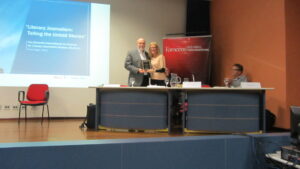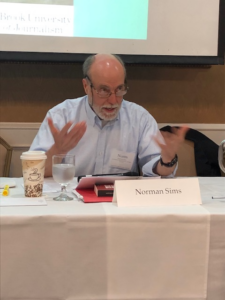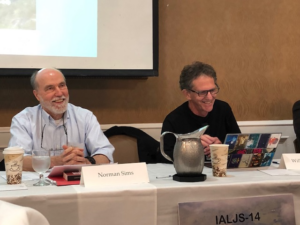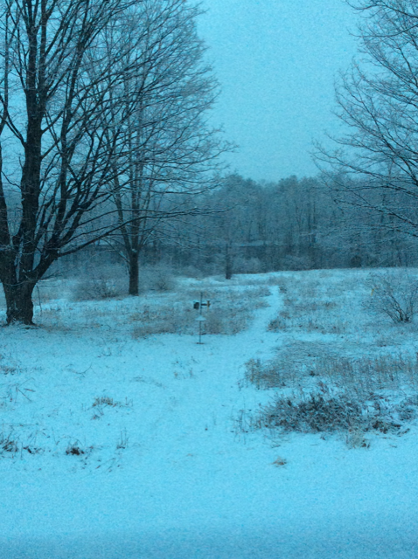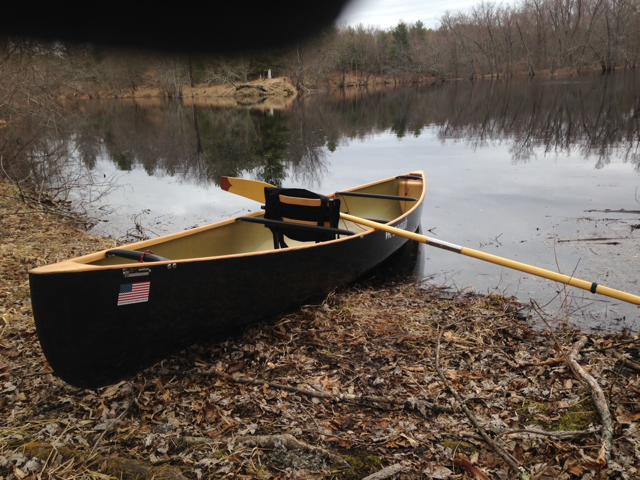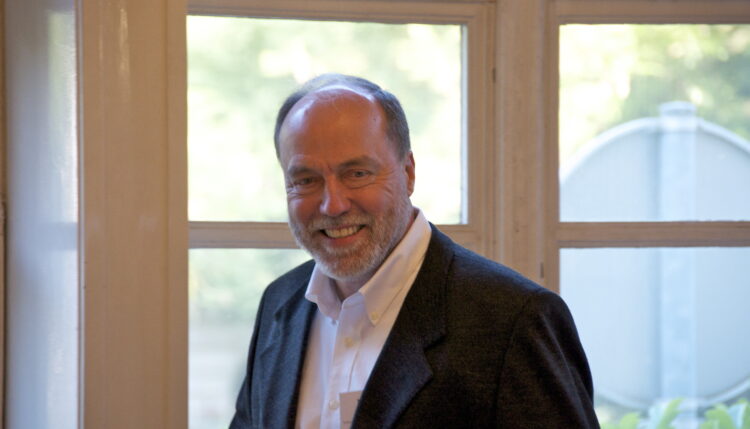
In Memoriam, Norman Sims
The field of literary journalism studies lost a giant this year
The field of literary journalism studies lost a giant on Sunday, May 15, 2022.
Norman Sims (1948-2022), a professor emeritus of journalism at the University of Massachusetts, Amherst is widely acknowledged as the founder of the field. His three edited volumes as well as his ground-breaking True Stories: A Century of Literary Journalism provided the inspiring foundation for a global family of scholars and students who are indebted to his pioneering work. Norm was a friend to all in the field and particularly to the students attracted to this upstart area and whose work and careers he supported with his generous mentorship. Literary journalism would not be where it is today were it not for Norm, and for that we remember him with warmth and gratitude.
Following Norm’s death, the University of Massachusetts Amherst Office of News and Media Relations issued the following obituary:
Born on January 26, 1948, in Paris, Illinois, to Julia Burnside Sims and H. Nolan Sims, he grew up in Mattoon, Illinois and graduated from Mattoon High School in 1966. Sims earned a B.A. in journalism from the University of Illinois in 1971. After working at United Press International in Minneapolis for two years, he went back to receive an M.A. in American History from the University of Illinois Chicago, and then entered the Ph.D. program at Urbana, graduating in 1979. While there, he studied under his mentor, James W. Carey, in the College of Communication.
By 1979, he had arrived as an assistant professor in the Journalism Department at UMass Amherst, where he taught for 35 years, until 2014 when he retired as a full professor.
Norm published several books, including several influential in the world of long-form narrative journalism: Literary Journalism, Literary Journalism in the 20th Century, The Literary Journalists, and True Stories, a Century of Literary Journalism. As a member and then president of the International Association for Literary Journalism Studies, he traveled worldwide.
For many years, he did volunteer work for the Appalachian Mountain Club (AMC) in river hydropower relicensing cases, most notably on the Deerfield River in Massachusetts and more recently on the Connecticut River. He served on the AMC Board of Directors for 12 years, and was for most of those years chair of the Conservation Programs Committee. In 2016 he was awarded AMC’s Distinguished Service Award.
Sims was an expert whitewater canoeist. He paddled many big and small rivers including the Colorado through the Grand Canyon, the Rogue River in Oregon, and the Gauley River in West Virginia. During his early involvement in boating he built several wood-strip canoes, and in later years he owned and restored antique canoes. His last book, Canoes: A Natural History in North America, was co-authored by Mark Neuzil.
Survivors include his son Gordon, daughter-in-law Jill (nee Levasseur) and grandsons Oscar and Julian, his sister Julia Anne Petefish, his ex-wife Deborah Rubin, and his partner of 24 years, Diane deGroat. His brother Nolan Sims predeceased him.
Below, his friends and colleagues offer their remembrances of Norm.
Members of the academy are supposed to pursue the life of the scholar, the teacher and of service. Norm Sims was nothing less than the paragon of all three.
As a scholar, he played a paramount role in establishing literary journalism as an academic discipline. The books he authored – Literary Journalism; Literary Journalism in the 20th Century; The Literary Journalists; and True Stories, a Century of Literary Journalism – were the founding milestones of the study of long-form narrative journalism. (I had the honor to serve as general editor of the latter volume.) His intellectual rigor, thematic insights, and graceful writing ensured his books will stay in print for many years to come.
As a teacher, Norm’s commitment to students, both his own and virtually anyone who approached him, was truly inspiring. After the International Association for Literary Journalism Studies was established he delivered the keynote speech at the learned society’s first annual conference, in Paris in 2007. From that moment forward countless student members of the IALJS who approached Norm in person at conferences or via email received genuine attention and thoughtful encouragement that they considered invaluable. Further, during his term as IALJS president his signature effort was the creation of a Student Travel Fund to help students present their work at the annual conference.
Regarding service, Norm served for many years as chair of a major conservation committee of the Appalachian Mountain Club, a volunteer organization that maintains roughly a third of the Appalachian Trail. A passionate canoeist and environmentalist, he was instrumental in the club’s efforts to preserve many New England rivers. This effort led, perhaps indirectly, to his last book, Canoes: A Natural History in North America.
I would be remiss if I failed to mention Norm’s sense of humor: wry, dry and wicked fast. He seemed to view much of life as the human comedy and the academy as an institution that often needed encouragement to live up to its ideals.
I can still hear his laugh. I will miss it, and him, terribly.
David Abrahamson,
Northwestern University, Illinois, U.S.A.
Norm’s kindness, generosity and humility are traits that I have come to admire in all IALJS members, especially those, like Norm, who have eminent stature in the field. We often find in other disciplines (in particular, mine) a certain standoffishness. That was not the case back in 2007, nor in the many years that followed when our paths crossed: Aarhus, Turin, Istanbul, Kosice…
Norm ended up coming back to Nancy, France, with me after the 2007 Paris congress. He had a few days before his return flight, and the price of room and board at my house (as John Hartsock, Roberto Herrscher, Kathy Roberts Forde and others can attest) was reading bedtime stories to my kids each night, which Norm eagerly did. One day, he even went to the park with us and took photos – the one he took of my daughter still hangs in my office. During his stay, we spoke extensively about a book proposal to the U of Massachusetts Press that would eventually become Literary Journalism across the Globe. At IALJS 3 in Lisbon the following year he brought me the good news that the proposal was accepted. Work thus began on that collection over breakfast.
As many of the tributes will attest, Norm was a gentleman of the first class, always eager to help anyone, especially graduate students. The news of his death saddened all of us. We have surely lost one of our lions.
John Bak,
Université de Lorraine, France
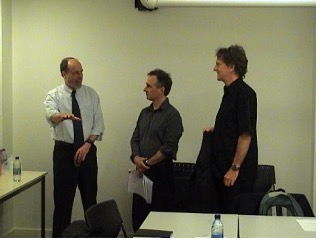
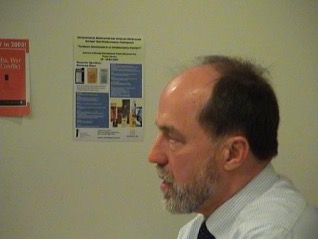
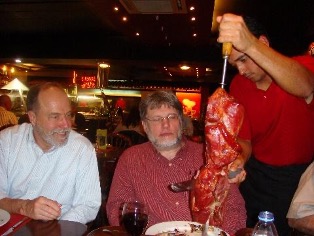

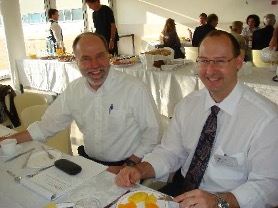
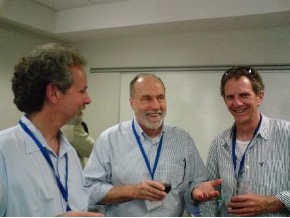
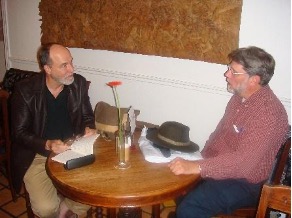
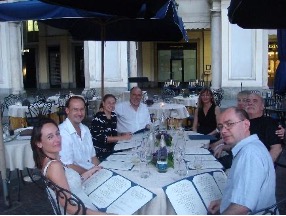
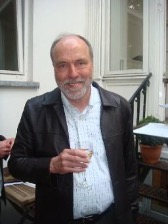
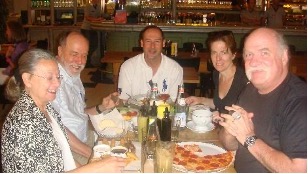
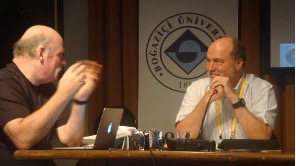
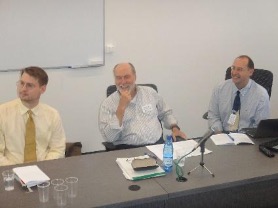
It is May 2007 and Norman Sims has just made history as the first keynoter at a conference of the IALJS. A junior, a month away from defending her thesis, I am sitting at the same table as the people I have used in my research: John Hartsock, David Abrahamson, Norman Sims. “Can you believe this?,” my mind asks. At a talkative lunch I notice Sims’ easy smile and polite manners; he is enjoying a leafy salad while I indulge in steak tartare. For a few moments the topic of conversation is where everyone stands on raw meat. Thus it came to happen that my meeting one of the trailblazers of literary journalism was overshadowed by uncooked food.
Norm became a regular at IALJS conferences and our fourth president. For the inaugural issue of Literary Journalism Studies in 2009 he penned the essay “The Problem and the Promise of Literary Journalism Studies”. The article that followed his was called “South: Where Travel Meets Literary Journalism” and was signed by the steak tartare Barbarian. That my musings on Portuguese literary journalism succeeded Norm’s contemplation of the field still makes me think of the twists and turns of life: the student following the master.
In 2018 paradox also landed me an invitation to write Norm’s profile for the Brazilian journal Revista Observatório. Feeling that a legion of his colleagues could do it with more grace and panache than me, I tried to portray Norm from my perspective: towering academic, generous teacher, enthusiast of the great outdoors, someone whose emphatic character makes it agreeable to be in their presence. I am grateful for the chance to write his profile. It gave me an opportunity to interview him and a number of his friends and colleagues.
My tribute to Norm would not be complete without mentioning a moment for which I am grateful, humbled, and flummoxed in equal measure. It can be seen in this photo. We are in Porto Alegre, Brazil in 2016, and I am presenting Norm with a plaque celebrating his time at the helm of the IALJS. In a few minutes, the student would follow the master in the same role…
Thank you, Coincidence, for the twists and turns.
Thank you, Norm, for leading.
Isabel Soares,
Universidade de Lisboa, Portugal
I have many, many fond memories of Norm. He absolutely loved white-water canoeing and one time headed to the hills and streams and mountains of West Virginia with his backpack and canoe. He was there a week or so, just Norm and nature.
One time he was in St. Paul to work on a collaboration with my St. Thomas University colleague Mark Neuzil. When Norm and Mark discovered that no one had written a detailed history of the canoe in North America that became their next project. (Like Norm, Mark eventually built his own canoe.) John McPhee wrote the foreword and in 2016 they published Canoes: A Natural History in North America.
One day when Norm was in St. Paul he spent the day with me. What did we do? I took him to the Stone Arch Bridge that crosses over the Mississippi River. We gazed at the roaring waterfalls and at downtown Minneapolis a short distance away. As we stood on the bridge, Norm gave me an informative, informal lecture on the Mississippi and the falls. This was typical Norm.
And there was the time we were in Halifax for a conference and… Well, that’s a story for another day, perhaps when we’re all together again.
Rest in peace, my friend.
Tom Connery,
St. Thomas University, Minnesota, U.S.A
In a 2015 review of Tom Kunkel’s biography of Joseph Mitchell, Janet Malcolm referred to Mitchell giving interviews “to a professor of journalism named Norman Sims.” This clunky phrase became a family joke, because it brought together many people we knew well.
Tom was my former dean at Maryland. Janet was my mother’s first cousin. (In 2018, Janet published a New Yorker story replete with weird innuendos, outright errors, and wholly unfair claims about her uncle – my grandfather – who saved her family from the Nazis… but that’s another story.) Most importantly, she should have written, “to the professor of journalism Norman Sims” or “to Norman Sims, the founding father of scholarly studies of literary journalism” or “to Norm Sims, intellectual, outdoorsman, environmentalist, and all-around good guy.”
Norm never would never have produced such awkward language. He was the master of elegant, polished phrasing: when recalling an anecdote from our grad school years studying under the tutelage of Jim Carey; when telling a joke; when writing a paper.
Decades ago, I heard Norm critique an AEJMC paper so thoughtfully that I asked him whether I could hire him to edit everything I wrote. I should have literally done this; it would have saved me from publishing tons of dreadful prose.
Linda Steiner,
University of Maryland, U.S.A.
I met Norm fleetingly in Minneapolis in 1972, when I worked at AP and Norm at UPI. The two wire services were in offices across the street from the Minneapolis Tribune, from which we fiercely competed in lifting stories.
We met again in 1975 when I was a grad student at Wisconsin and Norm a grad student at Illinois. He had come up with Jim Carey and other Carey acolytes to discuss journalism history. As devotees of social science we Wisconsonians were intrigued by, but skeptical of, the Illinoisian approach to cultural studies. But I was immediately enamored of Carey, Sims and the entire Careyian troupe of cultural etherealogists.
After that Madison gathering, I met Norm occasionally, including a visit or two in Massachusetts. We often fondly recalled that delightful and fateful (for me) meeting in Madison. Now I can scarcely believe that it was 50 years ago that Norm and I were young journalistic peons, laboring side-by-side in downtown Minneapolis.
Dave Nord,
Indiana University, U.S.A.
Reading Norm Sims writing on literary journalism in 1995 was a light bulb moment for me. A controversy had erupted in Australia over the publication of Helen Garner’s The First Stone, an account of a sexual harassment case at the country’s most prestigious university. One strand of the controversy centered on how Garner, on the advice of her publisher’s lawyers, altered the manuscript so that the chief supporter of the women alleging sexual harassment was cut up into six different people. This had the effect of magnifying one of the book’s narrative themes – that a group of puritanical feminists at the university conspired to bring down the master of the college.
When the chief supporter publicly identified herself as all six different people, I felt unmoored. What had I been reading, fiction or nonfiction?
I found my bearings when reading Norm’s’ introduction to his first book, The Literary Journalists. In it he writes: “As a reader, I react differently to literary journalism than to short stories or standard reporting. Knowing this really happened changes my attitude while reading. Should I discover that a piece of literary journalism was made up like a short story, my disappointment would ruin whatever effect it had created as literature” .
I will be forever grateful to Norm for nailing that principle for readers as well as writers. It anchored me in writing a chapter for a book about The First Stone case and has guided much of my thinking and writing about literary journalism since.
Matthew Ricketson,
University of Canberra, Australia
I have so many fond memories of Norm over the years, including the time he drove from his house in Amherst, Massachusetts to our place in Saratoga Springs, NY, with his trusty canoe in tow. I think my husband John and I harnessed up our kayaks and we all went up to nearby Lake George in the Adirondacks for paddling fun.
I first met Norm at least 35 years ago, at a conference in the Twin Cities when I was teaching at the University of Minnesota. One night a group of us including John Pauly and Tom Connery went to a popular St. Paul watering hole – maybe Frost’s? I was impressed with Norm’s vast knowledge of both literary journalism and wine, both of which he graciously shared.
I always felt a bond with Norm not only because of our common scholarly interests, but because he grew up in Mattoon, Illinois, a small, rural Midwest town where his dad was my paternal Uncle Wally Roberts’ insurance agent. Norm was a good schoolbuddy of my favorite cousins, Ross and Tim Roberts (I think he was in Ross’s class.) Later, he went on to write the wonderful canoe book with Mark Neuzil, one of the graduate students I taught at Minnesota.
The last time I saw that duo together was in April 2017, not long after the publication of their book, when they breezed through Saratoga Springs on a national book tour. Well, they held court at Northshire Books downtown and later at our home and Norm was ever the raconteur and informative guide to all things canoe. As always when asked, he dispensed voluminous knowledge so entertainingly that only later did you realize how much valuable information you’d soaked up. Typically, he was modest to a fault about his many talents and achievements.
Rest in peace, dear friend.
Nancy Roberts,
University at Albany (SUNY), U.S.A.
I came into academia as a journalist, and I worried that learning to think like a scholar might destroy my ability to read literary journalism for pleasure. True Stories: A Century of Literary Journalism was the first book of literary journalism history I read from cover to cover. I read it at my desk and at the pool, while ignoring piles of laundry and the demands of my young children.
Soon after that I wrote my first academic article, citing Norm, of course. I loved how he interviewed literary journalists and was committed to accuracy as a requirement of literary journalism. At every IALJS conference I enjoyed talking with Norm, a scholar who never stopped being a pleasure reader.
The last time I saw him, at the Stony Brook, NY, conference in 2019, I told him True Stories was the book that made the biggest impact on me while I was earning tenure, and it will always be in the Kent State University library because of that. He gave me the warmest smile.
Jacqueline Marino,
Kent State University, U.S.A.
Porto Alegre, Brazil in 2016 was the first IALJS conference that I attended. During one of the breaks, I saw Norman Sims having a coffee and decided to approach him, carrying my old copy of his 1995 book, Literary Journalism. In a serene way, he kindly engaged in conversation.
At one point I asked him which was his favorite piece in the book. He put the coffee cup down, and his face got thoughtful for a few seconds. I was afraid of not understanding properly, so asked if he would be kind enough to write it down. Gently, he took his notepad and wrote: “John Vallaint, ‘The Tiger’.” He paused thoughtfully for another moment and wrote a second title on the same sheet: “Michael Paterniti, ‘The Telling Room’.” And he signed his name underneath. The break was over and we returned to the auditorium.
I looked at the yellow sheet today and was glad to see his signature: Norman Sims. I am very grateful to have had the chance to meet one of the pillars of our field.
Monica Martinez,
Universidade de Sorocaba, Brazil
I will never forget when I first met Norm in person at the Minneapolis IALJS conference in 2015. We ran into each other between panels and began ruminating about the prospect of a “New” New Journalism or even a Supreme Nonfiction of the sort defined by Robert S. Boynton. As we traded exemplars of the craft of narrative journalism – Sebastian Junger’s The Perfect Storm came up – he stopped and fixed me with his eye.
“Write this down,” he said in total earnestness, cutting through the formality of polite conversation. I smiled, assuming he was joking. “No, write this down,” he insisted. “Michael Paterniti,” he said, spelling the last name slowly for me. “This will blow you away,” he said, eyes widening. “It’s called ‘The Long Fall of One-Eleven Heavy.’”
Paterniti, like Tracy Kidder, held a special place in Norm’s pantheon of great longform journalism. He went on to detail the richness of the layered and multivalent storytelling in Paterniti’s Esquire piece. He warned that after reading it I would never board a plane quite the same way again. He was right.
When I step on my next flight I will not point skyward for divine protection, but to acknowledge Norm’s suggestion, one of many he made during his lifetime as a connoisseur of the craft of this fine art.
What Norm leaves us with is his ear – his acute sensitivity to how narrative journalism like Paterniti’s and Kidder’s is capable of revolutionizing how we communicate. That, and what it means to share our sensations and emotions with one another.
David Dowling
University of Iowa, U.S.A.
Norman Sims was one of the first scholars I encountered after transitioning into academia after 15 years in journalism. At the time, my understanding of scholarship was average at best. At my first IALJS conference, Norm challenged my arguments about immersion journalism. I stammered in response and tried in vain to remain confident. He dressed me down politely, but in no uncertain terms, for what he deemed my problematic assumptions and overly decisive conclusions. At the end of the session he approached me: we were going to breakfast, he told me. It wasn’t a question or an invitation. It was a statement.
At breakfast he pressed me on some of my arguments again. I tried to dig in and show him I wasn’t afraid. But he gently upbraided me anew: scholars need to be careful about trying to be too certain in their arguments. He gave me a needed lecture on the risks of trying to be too definitive – namely, missing the nuances and subtleties of meaning.
While I blanched at first, I have tried to incorporate his cautions in my research and teaching ever since. He smacked me down and I respected him dearly for it. Mentorship is a huge part of his legacy. Norm was always working to better the field in ways big and small.
Patrick Walters,
Kutztown University, Pennsylvania, U.S.A.
The first IALJS conference I went to was in London in 2010. When I read the program I was amazed at all the names I recognized. A newcomer to literary journalism, I felt surrounded by rock stars. Overwhelmed at the conference, I at first worked to make myself unnoticed.
During the introduction panel, Norman took the stage and greeted everyone in the audience as friends and colleagues. He was so welcoming and open that my fear as a newcomer slowly faded away.
During that day I somehow found the courage to go up to him and introduce myself. He greeted me with a pat on the shoulder and said, “you’re the student from Portugal, right?” I said yes and thanked him for awarding me a student travel fund grant. He said the fund was an important part of IALJS and he was very proud of it.
During the following years at IALJS conferences I always made sure to say hi and he always greeted me with a jovial smile, making me feel welcome each time. Because of him and others I never felt like a student at the IALJS, but rather like a colleague and a friend.
Manuel Coutinho,
Universidad Católica Portuguesa, Portugal
Although I never took a class with Norm Sims, I am and will forever be one of his students. As a young reporter, working a city council beat (while reading Ulysses on the sly), his two anthologies offered hope of the possibility of doing journalism differently.
Later, as an academic with a doctorate and working in an English literature department, his example gave me license to venture beyond the canon to propose a course in literary journalism. Research for that course led me to the Call for Papers for the 2006 meeting of the IALJS in Paris, and thus to Norm himself. He was the keynote and, much to my delight, an utterly amusing and genial lunch companion.
The enormity of Norm’s legacy was driven home for me, however, the morning I learned of his passing. I had just scanned a letter of gratitude from John Brick, a recipient of the 2022 IALJS Student Travel Fund Award and in-person participant at the Santiago conference. The Student Travel Fund was Norm’s baby, and I had wanted to get the scan to him, just so he could get a sense of the cascading effect of his generous initiative. Sadly, he never got the note. It does seem appropriate, though, to include it here.
Rob Alexander,
Brock University, Canada
(With thanks to Dr. John Brick for permission to share)…
To the IALJS Awards Committee,
I write to express my gratitude for the generous award of the Student Travel Fund.
Aside from being the obvious financial stabilizer, it’s an investment – in my own work, but mainly in the richness that I will bring from Santiago back to my students in Milwaukee, where it will continue to grow and flower.
Thanks very much.
John F. Brick
Marquette University, Wisconsin, USA
Norman Sims will, for me – a relative latecomer to the scholarly world of literary journalism – always be a source of profound insights. When literary journalists with persistence, competency, and sympathy bring to light “the dramatic details” of our complex and messy world, this granular stuff allows readers to recognize the “real world”.
I had the good fortune to meet him at a literary journalism conference a few years ago. It was such a brief encounter – everyone wanted to talk to Norm – yet our conversation has stayed with me. Not because of any profundities, but because he was so generous in spending even a few minutes with a somewhat nervous, second career graduate student. When I quote him now, as I often do when writing about literary journalism, I hear his voice above the clamor of the event: gracious in his encouragement and kind to a fault.
Thank you, Norman. I am honored to have met you, even for a few minutes, and will continue to hold your work dear.
Callie Long,
Brock University, Canada
2018 recipient of the Norman H. Sims Award for the Best Student Research Paper
Norm wrote a wonderful introduction to our international literary journalism issue a decade ago this spring, which David Abrahamson helped me conceptualize and execute. It included the last interview with Anthony Shadid before his untimely death.
Here is a quote from Norm’s essay:
“There’s a theory in earthquake prediction that says quakes on the edges of a fault system feed energy into other nearby faults. In international literary journalism, we can see quakes in one place and aftershocks in others… Quakes at the source, generally the United States, have shaken other approaches, but they also demonstrate that alternative approaches have grown up independently… Literary journalism may be the deepest form of journalism and the most rare. It deserves analysis as a lasting literary production.”
Norman Sims, “International Literary Journalism in Three Dimensions,” World Literature Today 86, no. 2 (March/April 2012): 33.
Daniel Simon,
University of Oklahoma, U.S.A
Many Norm memories will focus on his brilliant scholarship, his tireless advocacy for literary journalism, ethics and accuracy, and his captivating well of anecdotes about literary journalism giants like Hunter S. Thompson and John McPhee. Some of us are lucky enough to also remember his mischief and sense of humor.
Some years ago, Norm and I were discussing the 2012 presidential debate between President Obama and Mitt Romney and the public’s lack of interest. I mentioned that the television ratings for the reality program Here Comes Honey Boo Boo handily beat the debate numbers. Norm, having never heard of the reality show about a failed child pageant queen, was not only fascinated but deeply amused.
Every time I saw Norm thereafter, he made a joke about Honey Boo Boo. We also had several conversations about reality television being the intellectual opposite of literary journalism, his viewership of Ice Road Truckers and, eventually, the election of a reality TV personality as president of the United States. That horrified but did not surprise him.
This is how I will remember Norm. And I do hope he’s telling Truman Capote and George Orwell all about how a child beauty queen’s popularity predicted the near downfall of the American Experiment.
Melissa Nurczynski,
Kutztown University, Pennsylvania, U.S.A.
Norm, in his book The Literary Journalists, introduced me to a whole new way of looking at journalism and its potential to rise above the mundane news account. In the mid-’80s, I was attending graduate school at the University of Nebraska at Omaha – and not particularly liking what I was studying. I did, though, like what I found in his anthology.
Many years later, when I began my own attempts at literary journalism scholarship and attended my first IALJS annual conference, I finally met Norm – yes, the Norman Sims – in person. He did not meet my expectations.
I wanted him to be some grizzled academic ready to pounce on any epistemological or ontological discrepancy found in research. But that was not Norm. I quickly discovered that this giant in the field had the utmost respect for (and interest in) any new way to explore literary journalism.
He was a generous man, a great intellect, and a superior scholar.
Brian Gabrial,
Northwestern State University of Louisiana, U.S.A.
Not only a respected scholar, a literary journalism trailblazer, and a nature-lover, Norm was THE ultimate gentleman. His generosity was boundless. He was inspirational. He welcomed all newcomers to the IALJS, above all students, with incredible warmth and genuine interest.
In March 2020, when the pandemic hit New York hard, I was stranded in the city, ambulance sirens wailing night and day. I reached out to Norm for news. He suggested he could drive down and pick me up. I declined the offer, saying, “We are in lockdown, please stay safe!”
So Norm occasionally sent a few lines and pics from the country, “since you’re stuck in the city.” Images and words of his whereabouts: a river and pond, beaver lodges, the snow, his canoe, and an extraordinary bear. Enjoy his talent as a Whitmanesque poet-reporter-photographer.
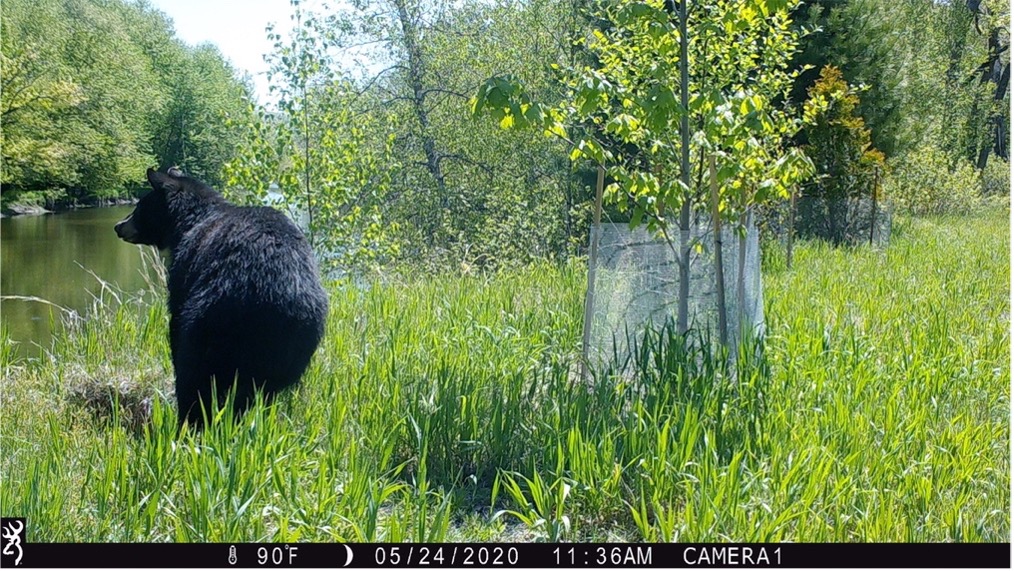
Isabelle Meuret,
Université Libre de Bruxelles, Belgium
I first got in touch with Norm in 2010, at the suggestion of David Abrahamson. I had no prior connection with either of them or the IALJS., Like David, Norm kindly responded, and was open and willing to help a stranger interested in literary journalism and related issues.
My research involved the history of feature journalism. Norm’s advice was that I should examine the “sketch” tradition of American journalism. His suggestion was spot on.
My foray into academic research (I was a practicing journalist then) paid off; this has now been my full-time job for five years. I owe Norm for his willingness to help, and can only imagine he did the same for countless others.
He shall be forever remembered for his contribution to the field, and for inspiring more people to join the academy of literary journalism.
Miki Tanikawa,
Akita International University, Japan
More than twenty years ago, while researching American Literary Journalism, I had the opportunity to read fundamental pieces of scholarship, among which Norman Sims’ work stood out. The Literary Journalists (1984) and Literary Journalism in the Twentieth Century (1990) crossed the Atlantic Ocean and were read in Portugal by someone who had encountered literary journalism as a field of study. But in my country there were no academic authorities who could vouch for the scientific validity of the study I was conducting.
Life sometimes offers you wonderful opportunities. Years later I was fortunate enough to meet the author I admired so much. I enjoyed his company, the chance to exchange thoughts with him and to listen to his teachings. These were always transmitted in clear and sound language, and with empathy for his audiences.
Norm proved to be everything I suspected from his writings: a very special scholar, a gentleman, and a wonderful person. So, wherever you are, let me say that your writing remains for future generations. And all those who were fortunate enough to meet you will really miss you!
Alice Donat Trindade,
Universidade de Lisboa, Portugal
The late, great Norman Sims agreed to write an endorsement for my book Behind the Text. While we communicated about this, we also communicated much more.
He wrote of his two concussions affecting his ability to read and remember; he wrote of the text he was working on with Mark Neuzil about canoeing. He shared its beautiful cover, a reproduction of a Winslow Homer watercolor, and his excitement at an upcoming canoeing trip in the Adirondacks. We shared memories of the Adirondacks.
I sent him photos of where I was at the time – on an epic road trip to Uluru from Sydney and back again. I wrote to him from the first and last pub in the Northern Territory, the Kulgera Roadhouse. He imagined me in the Outback and mused on its beauty.
The last time I spoke to Norm was at IALJS-14 on Long Island in 2019. At the banquet he came over to my table and very sincerely and earnestly promised that when IALJS held a conference in Sydney, he would come.
I feel bereft writing that now, knowing he can no longer keep his promise. I intend to keep it for him, to imagine a way to have his presence with us in Sydney in 2024.
RIP, Norm. Too soon. Far too soon.
Sue Joseph,
University of Technology, Sydney, Australia
